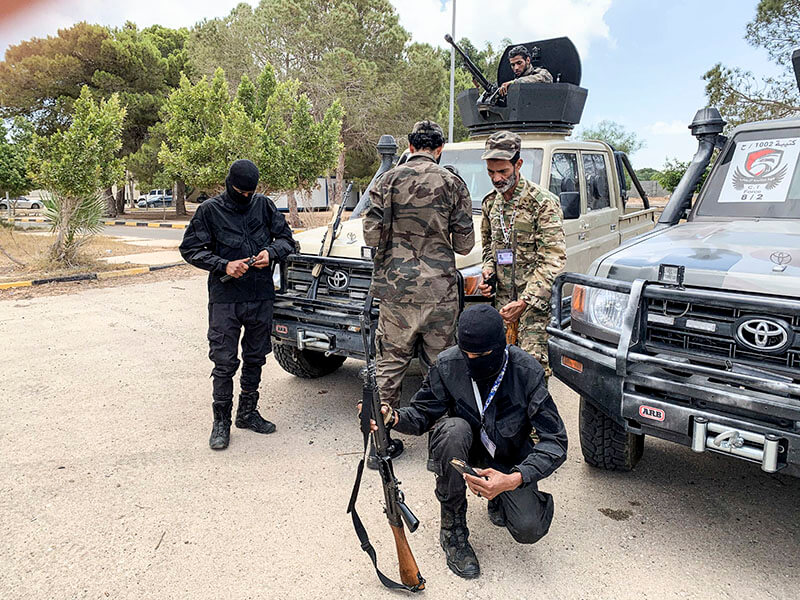Turkey’s reasons for sending extremists to Libya from northern Syria
It benefits in two ways: it eliminates the opposition that Ankara still have in Idlib and helps the GNA win the Libyan civil war

PHOTO/OMAR HAJ KADOUR – Members of the pro-Turkish Syrian National Army in the town of Sarmin, south-east of Idlib, Syria
“The deployment of Ankara mercenaries in Libya is intended to put an end to the deployment of extremists in northern Syria,” said former EU ambassador to Turkey and Libya Marc Pierini, who is currently an analyst at the Carnegie Endowment. “Turkish President Recep Tayyip Erdogan’s decision to send thousands of mercenaries to Libya aims to empty northern Syria of extremists, especially those who oppose Ankara’s policies in the country,” he said in a statement to the local Libya Review.
This would mean that Turkey would be trying to “eliminate” all the remaining obstacles to achieving effective control over the northern strip of Syrian territory, set as its main objective in its fight against the Kurds, grouped in the militia called People’s Protection Units (YPG), the arm of the Kurdistan Workers’ Party (PKK), which it considers a terrorist organization. After three offensives launched in 2017, 2018 and 2019 supported by the Syrian rebels, grouped in the Syrian National Army (SNA), on February 27th of this year began the last one so far, called ‘Spring Shield’, to respond to the attack suffered last February 27th that caused the death of 34 Turkish soldiers in the province of Idlib.

During this time, Turkey has managed to dominate large areas of northern Syria in which it has begun to “establish local governments and institutional infrastructure supervised by Turkish military officials and civilians,” according to analyst Semih Idiz in Al-Monitor, all supported by the more than 10,000 soldiers that have been deployed to Ankara and the 7,000 military trucks and armored vehicles that have been sent to Idlib. In addition, it should be recalled that the Turkish lira was recently introduced into the areas under its control. “All signs indicate that Turkey is preparing to stay in parts of the region it controls for the long term,” says the expert. Therefore, the transfer of northern Syrian extremists to Libya would fit in as the next logical step in advancing its plans for total domination of that territory.
But this movement benefits not only Syria, but also the North African country, where it is trying to implement a similar agenda based on its interests over Libyan and eastern Mediterranean energy resources. To do this, he needs his ally, the Government of National Unity (GNA), led by Prime Minister Fayez Sarraj, to win the Libyan civil war, which has been open since 2011, in which he is facing the National Liberation Army (LNA), commanded by Marshal Khalifa Haftar. Since the latter side launched an offensive against the country’s capital, Tripoli, last April, the Eurasian nation has intensified its presence in Libya in support of its partner, the GNA, by sending more than 15,300 mercenaries, mostly Syrian.

He has also deployed troops from his army to some military installations in the country, such as Al-Watiya, which was bombed a few days ago, as well as a network of drones that counter attacks by the rival faction. Similarly, it has installed “a formidable array of air defence missiles in the west of the country”, making significant progress “in establishing an air defence bubble”, as explained by the Syrian Observatory for Human Rights (SOHR). Currently, its centre of operations is located on a Turkish Navy warship in the Mediterranean Sea off the Libyan coast. This deployment of military force has enabled Turkey to recently announce the military victory of the GNA over Tripoli, after achieving a number of important advances in the rest of the country, slowing down Haftar’s troops.
According to the Syrian Observatory for Human Rights (SOHR), of the 15,300 militiamen that Turkey has transferred to Libya, 300 are between the ages of 16 and 18. The London-based organization has also documented that 459 mercenaries have already been killed in combat, including 30 minors. It has also recorded the return of 5,250 to Syria, whose contracts have already expired.

The Italian diplomat also warned that it is “worrying” that “these extremists may try to cross into Europe, which represents a real threat to the EU”. The SOHR notes that at least 400 recruits have already managed to enter EU territory through Italy, through smuggling operations and with the help of the migration mafias.

